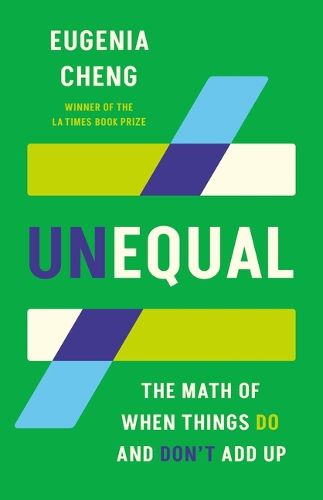Readings Newsletter
Become a Readings Member to make your shopping experience even easier.
Sign in or sign up for free!
You’re not far away from qualifying for FREE standard shipping within Australia
You’ve qualified for FREE standard shipping within Australia
The cart is loading…






An exciting "new perspective on equality and difference" (Stephon Alexander) that shows why the familiar equal sign isn't just a marker of sameness but a gateway into math's--and humanity's--most profound questions "Eugenia Cheng has opened up my mind to the wondrous world of pure mathematics in a way that I never thought was possible."-Willow Smith, singer and actress
Math is famous for its equations: 1 + 1 = 2, a^2 + b^2 = c^2, or y = mx + b. Much of the time it can seem like that's all mathematics is: following steps to show that what's on one side of an equation is the same as what's on the other.
In Unequal, Eugenia Cheng shows that's just part of the story, and the boring part to boot. Mathematics isn't only about showing how numbers and symbols are the same. It isn't even just about numbers and symbols at all, but a world of shapes, symmetries, logical ideas, and more. And in that world, the boundary between things being equal and unequal is a gray area, or perhaps a rainbow of beautiful, vibrant, subtly nuanced color.
As Unequal shows, once you go over that rainbow, almost everything can be considered equal and unequal at the same time, whether it's shapes (seen from the right perspective, a circle is the same as an ellipse), words (synonyms), or people--even numbers! It all depends on what features we care about. And it's up to us what we do about it. That's because mathematics isn't a series of rules, facts, or answers. It's an invitation to a more powerful way of thinking.
$9.00 standard shipping within Australia
FREE standard shipping within Australia for orders over $100.00
Express & International shipping calculated at checkout
Stock availability can be subject to change without notice. We recommend calling the shop or contacting our online team to check availability of low stock items. Please see our Shopping Online page for more details.
An exciting "new perspective on equality and difference" (Stephon Alexander) that shows why the familiar equal sign isn't just a marker of sameness but a gateway into math's--and humanity's--most profound questions "Eugenia Cheng has opened up my mind to the wondrous world of pure mathematics in a way that I never thought was possible."-Willow Smith, singer and actress
Math is famous for its equations: 1 + 1 = 2, a^2 + b^2 = c^2, or y = mx + b. Much of the time it can seem like that's all mathematics is: following steps to show that what's on one side of an equation is the same as what's on the other.
In Unequal, Eugenia Cheng shows that's just part of the story, and the boring part to boot. Mathematics isn't only about showing how numbers and symbols are the same. It isn't even just about numbers and symbols at all, but a world of shapes, symmetries, logical ideas, and more. And in that world, the boundary between things being equal and unequal is a gray area, or perhaps a rainbow of beautiful, vibrant, subtly nuanced color.
As Unequal shows, once you go over that rainbow, almost everything can be considered equal and unequal at the same time, whether it's shapes (seen from the right perspective, a circle is the same as an ellipse), words (synonyms), or people--even numbers! It all depends on what features we care about. And it's up to us what we do about it. That's because mathematics isn't a series of rules, facts, or answers. It's an invitation to a more powerful way of thinking.